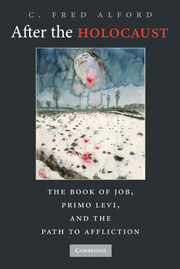5 - Conclusion: Beyond the Silence of Job
Published online by Cambridge University Press: 05 June 2012
Summary
Man, being a brave animal and one accustomed to pain, does not necessarily flee suffering. Often enough, he seeks it out, provided he can grasp a meaning for it. Being a sickly animal, suffering generally finds humanity out, whether or not humanity goes looking for it. Man's problem is not and never was that he suffers, “but that there was no answer to the crying question, ‘Why do I suffer?’” (Nietzsche 1968a, 598 [iii, 28]) – at least, not since the death of God who, according to Nietzsche, has been moribund for some time (Nietzsche 1974, 180 [iii, 125]).
The Book of Job reveals that the issue is not quite so straightforward: Not only does Job not know why he suffers, but his odyssey ends when he learns from God that he is never going to find out. Job also learns that there is an order in the universe that culminates in a sublime beauty in which he – and we – may participate. This frames his suffering in an experience of transcendence, soothing his sorrow – or, rather, it soothes the suffering reader, who presumably will not be restored as Job was.
- Type
- Chapter
- Information
- After the HolocaustThe Book of Job, Primo Levi, and the Path to Affliction, pp. 129 - 156Publisher: Cambridge University PressPrint publication year: 2009



